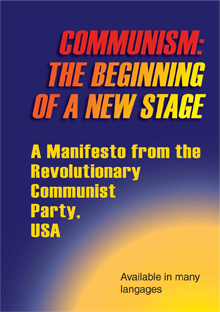Obama Trip to Asia:
The Bloody-Jawed Wolf Offers Peace and
Prepares for War
May 30, 2016 | Revolution Newspaper | revcom.us
What country incinerates and massacres literally millions of people for domination and empire, and then decades later pats itself on the back for returning to the scene of its towering crimes, not to make amends, but to utter a few peace platitudes, hug a few survivors, and lay a wreath or two—all to serve current military contention with other powers and possibly slaughter even greater numbers than before?
Answer: America under “peace” President Barack Obama.
Exhibit A: Obama’s May 22-27 trip to Asia.
As Obama traveled through Asia, preaching morality, peace, and reconciliation, powerful U.S. warships loaded with weapons of mass destruction were trolling the tense waters of the South China Sea, challenging and playing cat and mouse games with Chinese planes and warships.
Obama’s first stop was Vietnam. In 1961, the U.S. invaded this California-size country—a country that is nearly 8,000 miles away from the U.S. and had never committed anything that could remotely be conceived as an aggressive act against it. The U.S. then went on a 14-year rampage of mass murder and terror—bombing, burning, massacring, and poisoning three million Vietnamese to death.
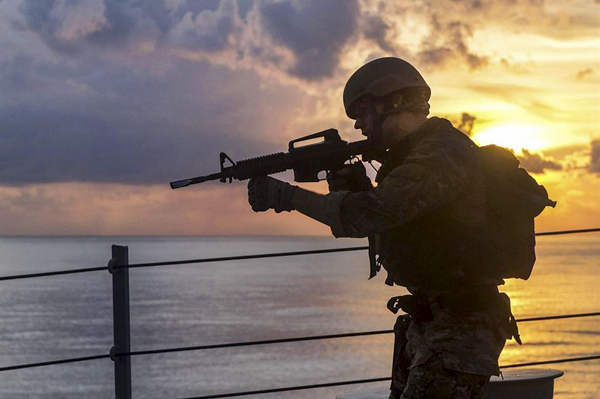
U.S. guided-missile destroyer, part of John C. Stennis aircraft carrier Strike Group, operating in the South China Sea. Photo: DOD
Did Obama apologize for this horror? Are you kidding? He papered over and even justified U.S. war crimes: the two countries had a “difficult history” and were “pulled into conflict,” as if they were both at fault. There was “pain and the sacrifices on both sides,” he said, as if 58,000 Americans counted for as much as three million Vietnamese whose whole country had been napalmed, carpet bombed, and poisoned. And capping it off, he claimed the U.S. stood for the principle: “Big nations should not bully smaller ones.”
Then, on May 27, Obama became the first sitting U.S. president to set foot in Hiroshima, Japan. Did he come to apologize on behalf of the United States for incinerating and irradiating more than 200,000 people to death there and in Nagasaki? For unleashing nuclear horror on humanity as the first and only country to ever use nuclear weapons? For justifying this slaughter with the bald-faced lie that it was necessary to avert an even bloodier invasion? Apologize? Get serious!
Obama acted like the U.S. nuke dropped itself – “death fell from the sky and the world was changed,” he began his speech in Hiroshima. He put the entire blame for the war on Japan. Then he supposedly paid homage to the victims, hugged a few survivors, and laid a wreath at the Hiroshima Peace Memorial. Of course, even here he had to make a big deal about the handful of U.S. prisoners of war who were killed by the bomb! And then, with a straight, sincere face, he pledged to work for a world free of nuclear weapons—all this with his finger on the world’s deadliest nuclear arsenal, and more importantly, as he orders $1 trillion (yes, you read that right, $1 trillion!) to be spent to expand and modernize the U.S.’s nuclear arsenal. The hypocrisy is astounding. It further continues when you consider that he’s cut fewer nukes from the U.S. arsenal than any president in the last 25 years, including George W. Bush.
All this would guarantee Obama a place in the lying, hypocritical, mass murderer hall of shame, but it wasn’t even the worst of it. All his excusing and justifying past crimes was part of getting ready for crimes to come.
As Obama traveled through Asia, preaching morality, peace, and reconciliation, powerful U.S. warships loaded with weapons of mass destruction were trolling the tense waters of the South China Sea, challenging and playing cat and mouse games with Chinese planes and warships. Obama didn’t mention China in his Vietnam and Hiroshima speeches. But this points to what his trip was really about: building up alliances and military power to aggressively confront and contain China, with violence and war if need be.
What the Hell Are U.S. Warships Doing in the South China Sea?
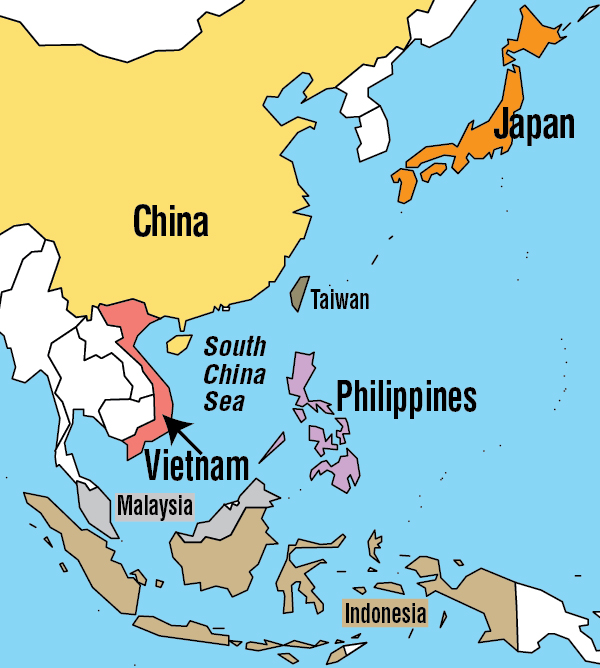
The South China Sea is at the southwestern edge of the Pacific Ocean and links it to the Indian Ocean. It’s one of the world’s key trade and transit routes, through which some $5 trillion worth of goods are shipped each year. And beneath these waters lie potentially enormous reserves of oil and natural gas.
China, Taiwan, the Philippines, Malaysia, Indonesia, and Vietnam all border the South China Sea and all have competing territorial claims. In recent years, China has moved aggressively there, building up various reefs and shoals into actual islands that it is claiming as its own. (China has added more than 3,200 acres of land to build these up since 2013.). Some are basically military bases, complete with runways, and China claims it has the right to control navigation through the nearby waters.
Pardon us, but the last time we looked, the South China Sea was not Lake Fucking Michigan or even the Gulf of Mexico. The South China Sea lies halfway around the world from U.S. shores! The U.S. has no claims there that could be considered legitimate by any stretch of the imagination—but it has huge economic interests ($1.2 trillion worth of U.S.-traded goods goes through the South China Sea every year), and a crucial part of U.S. global dominance is its overall control of world trade and navigation. So the U.S. claims the “maritime freedom” to send its warships (and project military power) to pretty much any corner of the globe, including through the South China Sea. The U.S. will “continue to fly, sail and operate wherever international law allows,” Obama declared in February.
The U.S. has openly challenged China’s claims. It frequently sends warships—often with high-ranking U.S. military and political leaders on board—through these waters to insist that China cannot dictate the terms of navigation, and flies military aircraft through this airspace as a show of U.S. dominance. U.S. ships are in turn being shadowed by Chinese warships while in the area, and China is issuing statements that these moves by the U.S. are basically dangerous provocations.
World War 2 & Today: Human Nature? Or an Expand-or-Die System?
In Hiroshima, Obama blamed Japan for starting World War 2 and said the war “grew out of the same base instinct for domination or conquest that had caused conflicts among the simplest tribes.” This is just a bullshit excuse and cover-up. This war was not caused by human instinct or “bad policies.” It arose out of a SYSTEM—imperialism.
In Hiroshima, Obama blamed Japan for starting World War 2 and said the war “grew out of the same base instinct for domination or conquest that had caused conflicts among the simplest tribes, an old pattern amplified by new capabilities and without new constraints.”
This is just a bullshit excuse and cover-up for the horrors of capitalism-imperialism. World War 2 didn’t grow out of human nature. It grew out of a battle between the world’s major capitalist-imperialist powers at the time over which would dominate and set terms throughout the world—even as it included wars of self-defense against imperialist invasion by the then-socialist Soviet Union and progressive wars of national defense in the colonies and oppressed nations—most notably China’s heroic battle against the Japanese imperialist invasion, in which communists played a critical role, under the revolutionary leadership of Mao Zedong.
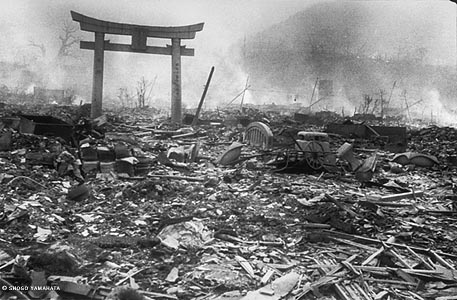
Hiroshima after the U.S. dropped the atomic bomb.
This was not about human instinct, or even “bad policies.” This war arose out of a SYSTEM—imperialism. Imperialism is a system in which huge blocs of capital dominate the economic life and exploit billions of people all over the planet... in which the most powerful capitalist-imperialist nations divide the world and its peoples into “spheres of influence” and contend with each other over how that plunder will be organized and divided... and in which that contention has meant dozens of horrible genocidal wars against the oppressed nations and peoples of Asia, Africa, and Latin America and—at key times—has erupted into massive world wars between the imperialists in which scores of millions have perished. It is an expression on a world scale, in politics and war, of the expand-or-die competition at the heart of capitalism.
World War 2 took place against the backdrop of a serious world economic crisis, massive political eruptions, attempts at revolution, and fascist coups. The previous division of the world that grew out of World War 1 felt like a straitjacket to each imperialist power—and each of these saw World War 2 as a way to get out of that straitjacket. They fought the war to pursue world dominance—including as part of it, Hitler’s Germany attacking what was then the socialist Soviet Union to bring it under German imperialist control. (In fact, the Soviet Union bore the brunt of the war, losing somewhere between 20 and 28 million people! For more on the Soviet Union, and the history of the revolution in that country, see the interview with Raymond Lotta, You Don’t Know What You Think You ‘Know’ About... The Communist Revolution and the REAL Path to Emancipation: Its History and Our Future.”) The U.S., which drew up plans for the “postwar order” long before the war had even begun, maneuvered and came through as the “top dog” of the imperialist camp—a position it still occupies today—in the process displacing Britain, and also defeating and bringing into subordinate status Germany and Japan.
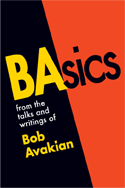
Imperialism means huge monopolies and financial institutions controlling the economies and the political systems—and the lives of people—not just in one country but all over the world. Imperialism means parasitic exploiters who oppress hundreds of millions of people and condemn them to untold misery; parasitic financiers who can cause millions to starve just by pressing a computer key and thereby shifting vast amounts of wealth from one place to another. Imperialism means war—war to put down the resistance and rebellion of the oppressed, and war between rival imperialist states—it means the leaders of these states can condemn humanity to unbelievable devastation, perhaps even total annihilation, with the push of a button.
Imperialism is capitalism at the stage where its basic contradictions have been raised to tremendously explosive levels. But imperialism also means that there will be revolution—the oppressed rising up to overthrow their exploiters and tormentors—and that this revolution will be a worldwide struggle to sweep away the global monster, imperialism.
Bob Avakian, BAsics 1:6
The use of the atomic bomb in Hiroshima and Nagasaki, a strategic decision on the part of the U.S., reinforced and signified this—bringing Japan to its heels and, importantly, signaling the U.S.’s willingness to inflict unprecedented brutality and suffering as the “top dog” of a vicious system, and one that would fight desperately to maintain that position. It proved this just a few years later in 1950 with its war against North Korea, in which U.S.-led forces killed three million North Korean people and destroyed all but two modern buildings in the country(!)... and in which key figures in the U.S. ruling class contemplated using nuclear weapons again—against China, which at that point was a revolutionary state led by Mao Zedong. (For more, see Interview With Raymond Lotta.)
Its horrific crimes against Vietnam and other countries in Indochina, like Laos and Cambodia in the 1950s, ’60s, and early ’70s, continued that imperialist-made ocean of blood and tears. Obama’s “peaceful” trip there now is just a different form of that contention in different circumstances. Today, U.S. imperialism battles to stay on top against a new and rising rival: China. Capitalism was restored there after Mao died in 1976 (even though China still calls itself “communist”), and so is now also being driven to expand its economic, political, and military reach. While the U.S. has been focused on the Middle East, China has cut deals and invested billions in the Middle East, Central Asia, Africa, and Latin America. And it has made military moves to nail down its dominance in the immediate region around it, concentrated in the South China Sea. This has brought China into conflict with the U.S., and control of the Asia-Pacific region in particular is once again being contested.
Obama’s Trip and His “Pivot to Asia” Strategy
This clash is intense and potentially explosive because the U.S. rulers, and Obama in particular, consider the Asia-Pacific region to hold the key to America’s survival as a dominant imperialist power. Atlantic magazine writer Jeffrey Goldberg extensively interviewed Obama and summed up his views this way:
For years, the “pivot to Asia” has been a paramount priority of his. America’s economic future lies in Asia, he believes, and the challenge posed by China’s rise requires constant attention. From his earliest days in office, Obama has been focused on rebuilding the sometimes-threadbare ties between the U.S. and its Asian treaty partners, and he is perpetually on the hunt for opportunities to draw other Asian nations into the U.S. orbit. His dramatic opening to Burma was one such opportunity; Vietnam and the entire constellation of Southeast Asian countries fearful of Chinese domination presented others.
Obama and the U.S. are determined to deploy the military power to make this a reality. This is why since he’s taken office, Obama has visited Asia 10 times, and worked to strengthen relations with countries in the region. This is why, even as the U.S. and China collude and negotiate sometimes when it serves their interests, the U.S. military has built a chain of air bases and military ports to encircle China. This is a big reason Obama has fought to push through the Trans-Pacific Partnership, which would set new, U.S.-favored terms for trade and business investment among the United States and 11 Pacific nations—and exclude China.
Obama considers the Asia-Pacific region key to America’s survival as a dominant imperialist power, and his Asia trip was part of the U.S.’s intense and potentially explosive rivalry with China. While he talked peace in public, behind closed doors the U.S. was negotiating military and strategic deals with Vietnam and with Japan and other world powers.
And China is making its moves in the South China Sea—embarking on a major military build-up, including building the biggest navy of any Asian country, fighting to line up its allies, and proposing its own Free Trade Area of the Asia-Pacific.
Preaching Peace While Sharpening Swords
Obama’s Asia trip was part of this strategic rivalry. While he talked peace in public, behind closed doors the U.S. was negotiating military and strategic deals with Vietnam and Japan and other world powers. Obama lifted a 41-year-old ban on selling Vietnam U.S. weapons, and reportedly discussed making the massive deep water port on the South China Sea at Cam Ranh Bay, once a staging area for U.S. bombing runs against the Vietnamese people, again available to the U.S. military.
His visit to Hiroshima was aimed in part at bolstering popular support for Prime Minister Shinzo Abe’s campaign to build up Japan’s military strength (which includes 47 tons of plutonium, enough for thousands of nuclear weapons) and perhaps break its prohibition on sending its military to other countries.
.jpg)
Against the backdrop of Hiroshima, Obama and Japanese Prime Minister Abe step up their military collaboration against China. Photo: AP
And after talking of peace and a moral awakening in Japan, he met with the Group of Seven (G7) imperialist countries (the U.S, Italy, Canada, France, Britain, Germany, and Japan), who sharply criticized China’s territorial claims in the western Pacific.
Think about it: Obama and the entire U.S. media was telling you that the whole lesson of this trip was how much the U.S. fights for and stands for peace, how the U.S. leads the whole world in learning from the past so that nations and peoples will cooperate. Obama, and the whole media, did everything they could to train you to see America as a force that may make mistakes once in a while, but is mainly a force for good. They papered over and justified huge war crimes that were carried out for the sake of empire... and to cap it off, did it all to serve their REAL aim—to line up forces for a possible conflict with China that could be far beyond the huge crimes they’ve already committed!
Seven Decades After World War 2 and Control of the Asia-Pacific Region Again Being Contested: Humanity Cannot Tolerate This
What does it tell you that seven decades after World War 2 and the towering war crimes of Hiroshima and Nagasaki, and four decades after the towering war crimes of Vietnam, that tensions between rival powers in the Asia-Pacific region are again escalating, and the U.S. rulers are again forging their alliances, building their militaries, and developing their nuclear arsenals, once again threatening to plunge humanity into a nightmare of death and suffering?
Two things: one, that such a system isn’t fit to rule and threaten the Earth for one more day, and must be overthrown through revolution at the soonest possible moment. Two, that those who rule this system face huge instability and threats and are driven to policies that could cause upheaval and shocks in the societies they rule, and that out of that soil could arise real openings for revolution—IF revolutionaries are prepared to work on and seize them.
Volunteers Needed... for revcom.us and Revolution
If you like this article, subscribe, donate to and sustain Revolution newspaper.

